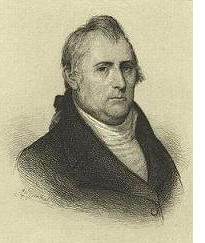 As a technical-writer for the U.S. Marshals Service, I have the privilege of working with some of the most dedicated people in federal law-enforcement. No other division under the Department of Justice can boast the history of the USMS. From its storied establishment in 1789 by George Washington, to its long list of noteworthy marshals including Frederick Douglass and Wyatt Earp, the USMS is the oldest, and in my opinion, the finest agency in the country. As a Virginia resident I am particularly interested in those who wore ‘the Star’ for my home state.
As a technical-writer for the U.S. Marshals Service, I have the privilege of working with some of the most dedicated people in federal law-enforcement. No other division under the Department of Justice can boast the history of the USMS. From its storied establishment in 1789 by George Washington, to its long list of noteworthy marshals including Frederick Douglass and Wyatt Earp, the USMS is the oldest, and in my opinion, the finest agency in the country. As a Virginia resident I am particularly interested in those who wore ‘the Star’ for my home state.
Edward Carrington was the first United States Marshal for the state of Virginia. Born in Cumberland County in 1748, he was a successful attorney who managed a large plantation as well as his family’s estate. He was also active in politics to the point of becoming a close confidant of George Washington’s. Carrington was approached by Washington to advise him on the growth of Thomas Jefferson’s Republican Party in the Old Dominion. He also provided critiques of potential cabinet candidates and offered opinions on what qualifications should be necessary for political appointments.
As a soldier Carrington served in the First Continental Artillery during the Revolutionary War. He rose to the rank of Lieutenant Colonel and was tasked as the quartermaster-general for Nathaniel Green’s Southern Campaign. During his service Carrington commanded artillery units in engagements against the redcoats at Hobkirk’s Hill and Yorktown. His military service off of the battlefield was equally noteworthy. In addition to being appointed to meet with British representatives to discuss an exchange of prisoners, Carrington was tasked with managing the selling of goods and property confiscated by the Continental Army.
After the British surrendered in 1781, Carrington returned home to practice law and manage his family’s properties. In 1785, and again in ’86, he was nominated as a delegate to represent the state of Virginia at the Continental Congress. In the spring of 1789, Carrington volunteered his services to the new government. Later that year, the United States Marshal Service was established by President Washington who formed the first federal law-enforcement agency under the Judiciary Act of September 24, 1789. Section 27 of that act reads:
And be it further enacted, That a marshal shall be appointed in and for each district for a term of four years, but shall be removable from office at pleasure, whose duty it shall be to attend the district and circuit courts when sitting therein, and also the Supreme Court in the district in which that court shall sit.(b) And to execute throughout the district, all lawful precepts directed to him, and issued under the authority of the United States, and he shall have the power to command all necessary assistance in the execution of his duty, and to appoint as shall be occasion, one or more deputies...
In appreciation for his many years of service, Carrington was appointed as the U.S. Marshal for the District of Virginia at the age of 41. He held the position for a little over 2 years (1789-1791) before he was appointed as the state’s Supervisor of Distilled Spirits.
In 1794, Carrington temporarily retired from public service while maintaining his friendship with Washington. When President John Adams was preparing to raise another volunteer army in anticipation of a war with France, Carrington was named as the supreme commander over an aging Washington. A few months later, America resolved the crisis with France and Washington died of pneumonia.
Carrington remained in Virginia and went on to serve two terms as the mayor of Richmond (1807-1810). During the first year of his first term, he served as the foreman on the jury for the Aaron Burr treason trial. After finding Burr ‘not guilty’ Carrington returned to the mayor’s office where he continued to serve until October 28, 1810, when he died at the age of 62.
References:
USMS website: The First Generation of U.S. Marshals
Congressional Biography: Edward Carrington
Constitution.org: Judiciary Act of September 24, 1789
Hopkins, Garland Evans. Colonel Carrington of Cumberland
Updated: Saturday, 19 March 2011 2:52 PM EDT
Permalink | Share This Post





